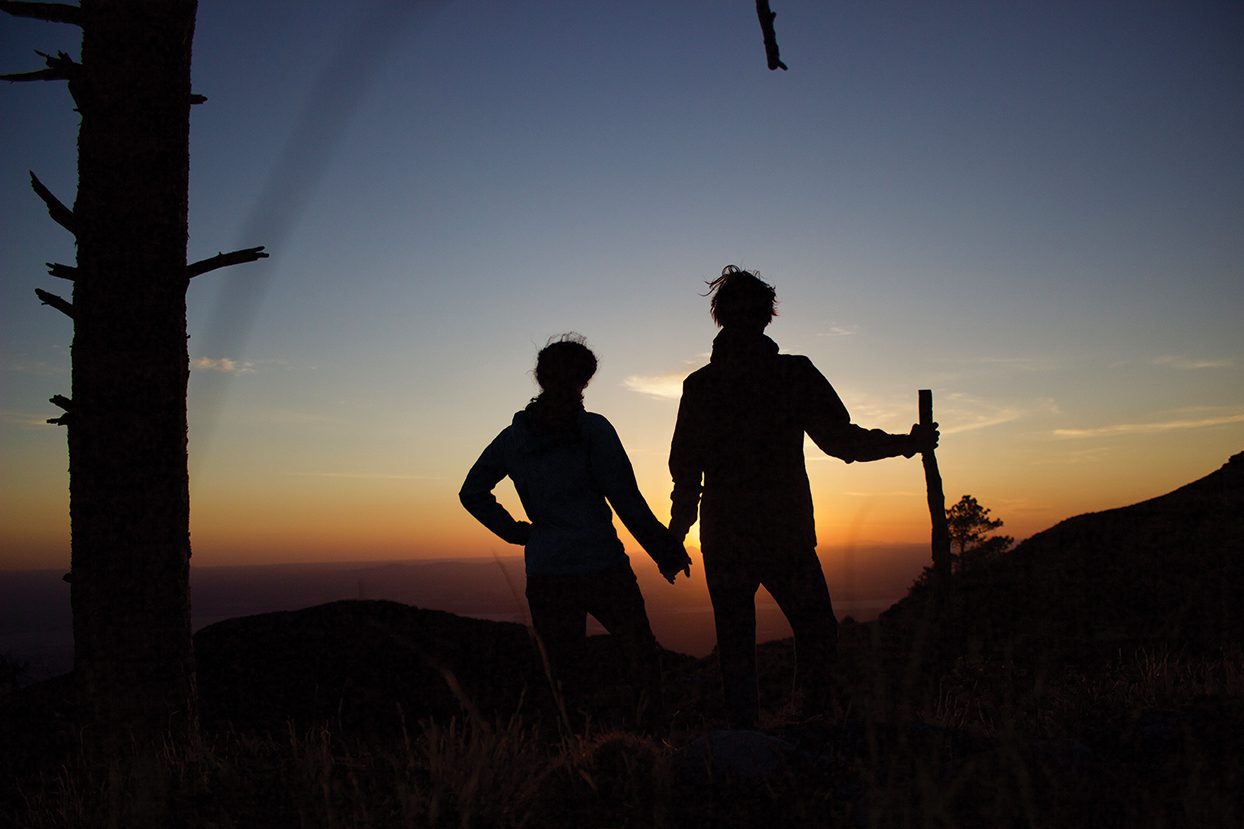
27 Sep In Wandering Pursuit
A young couple, a Kia Forte and the search for home
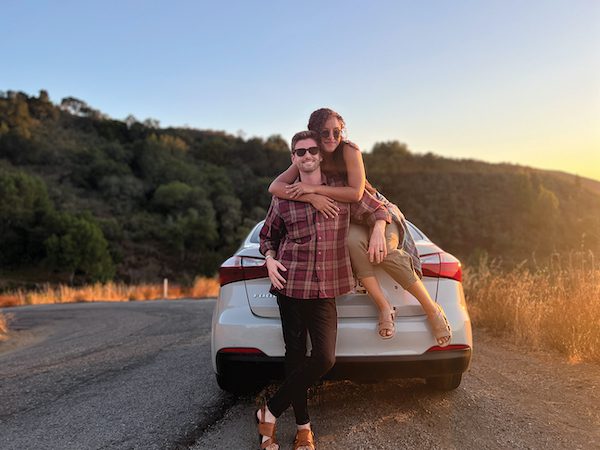
The newlyweds and their adequate Kia Forte at dusk overlooking the distant Morro Bay on California’s Central Coast, photo by Cassandra Hales
In the spring of 2017, I salvaged an old Chevy Astro from my home near Lake Tahoe, built a bed frame in the back, and traveled around the western half of America and mainland Mexico. In the spring of 2020, I bought a colonial house in the countryside of Maryland and drove around town in a sensible Nissan Murano, the platinum package with leather seats and a sunroof. Three months ago, in the spring of 2022, I got married, sold my house and car, and embarked on a journey west with my wife in her white Kia Forte, a model package so basic it didn’t even come with cruise control.
As new additions to the remote workforce, our goal was simple: Find the best place in America to live, and live there.
We began, as few journeys do, in San Antonio, in the middle of a political heatwave that burned hot in South Texas and a literal heatwave that killed 53 migrants trapped in a semitruck trailer.
My wife, Cassie, working from the bed of our short-term studio rental on the south side of town, wondered aloud if we had made a mistake. I answered her difficult question the same way I have always answered difficult questions. I loaded the car and picked a new place on the map.
We left San Antonio just before dawn. The air was cool, and for a moment I could almost believe in Texas.
Two days and 1,300 miles later, at a dinner party in Redlands, California, we regaled our friends with the short-lived attempt to settle in San Antonio and the ensuing road trip through New Mexico and Arizona.
In our retelling, long periods of bedridden depression in Texas became amusing observations about entitlement among the Millennial generation. The bat-out-of-hell journey across multiple states became a whimsical joyride through the American Southwest. The cramped, cruise control–less Kia became an ironic antidote to the #VanLife culture of wealth-on-wheels.
“That sounds amazing,” one friend said.
“You two are so lucky,” said another.
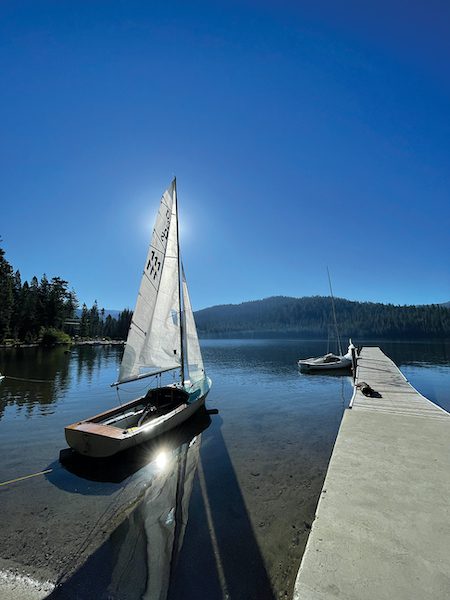
Nothing beats the heat of Texas like the alpine air of California’s Huntington Lake, photo by Cassandra Hales
“Are you considering Southern California?” said a third.
Cassie and I looked at each other. “Right now,” I said, “we’re considering everywhere.”
Three days later, at a sailboat regatta at Huntington Lake in the Central Sierra Nevada, we breathed in the scent of the high alpine and imagined what it would be like to live at 7,000 feet.
“Think of all the fresh air,” I said.
“Think of the views,” she said.
That night, seated around the campfire with Cassie’s aunt and uncle—retired now from sailing competitively, but still traveling America in their RV and offering race-day support from their tugboat—we listened with growing enthusiasm to their stories of Morro Bay and California’s Central Coast: sunsets, seafood, Big Sur and reliable swells.
“You have been meaning to surf more,” Cassie said.
“And you’ve been wanting pretty views,” I said.
We added Morro Bay to our growing list of destinations and fell asleep beneath the stars.
Sunday morning, as we continued our journey across California’s Central Valley toward 101 north and my parent’s house in Bandon, Oregon, we discussed our many options. Salsa lessons in Medellin! Surf lessons in Todos Santos! Ski Lessons at Kirkwood! Christmas in Manila! New Year’s in Tokyo!
The world was limitless. Self-actualization was within reach. Happiness like we’d never known was just a few more miles down the road.
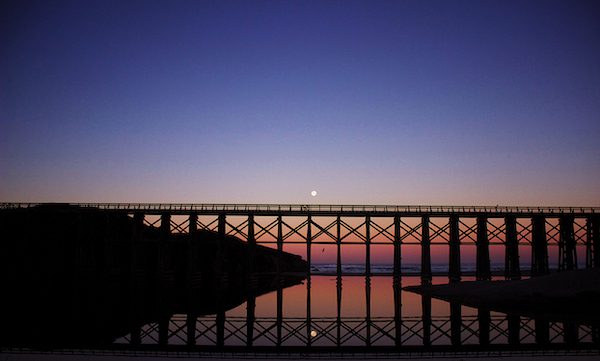
Sunset at Fort Bragg in Northern California, photo by Michael Rohm
Traveling the Endless Road
Coming out of Sacramento, I missed a turn. The GPS added 40 minutes to our next stop in Fort Bragg. Our conversation lagged. We fell silent.
After a long drive through the scorched hills around Clear Lake, Cassie, using her cellphone hotspot to answer work emails from the passenger seat of our Kia, wondered aloud if we were making a mistake. Would we find what we were looking for? What, exactly, were we looking for?
“Adventure!” I answered. “Freedom!”
We continued to drive in silence, but privately, I considered my apparent five-year circumnavigation from homelessness back to homelessness. From the foothills outside of Sacramento as a 27-year-old in a van searching for meaning on the road, back to those very same foothills as a 32-year-old. Still searching for meaning. Still on the road.
So many of my circumstances have changed. Back then, I was single, unemployed and broke. Fast forward five years and I am married, employed and financially secure. But the search continues as always, as though the circumstances of life—those events and experiences by which we judge our success—amount to nothing.
It is said that a successful life resembles an upward spiral, like a footpath winding up a mountain, but I was too dizzy to notice much of a view. Behind the wheel of the Kia, I still felt like the 27-year-old traveling through the deserts of northern Mexico in a Chevy Astro; the 23-year-old traveling through southern Africa in the backs of dusty public busses; the 20-year-old traveling across the western states of America on foot; the 16-year-old sleeping for months in a tent in the backyard with a dog-eared copy of Walden; the 6-year-old running off to climb trees on the family farm in the Willamette Valley of Oregon.
The spiral collapses inward and I am everything at once. The void remains.
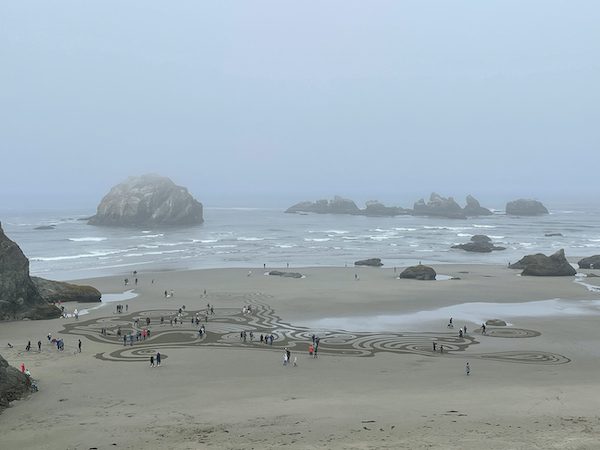
Circles in the Sand, a popular weekend event in the summer at Bandon, Oregon, photo by Cassandra Hales
Lost in the Maze
In Bandon, Oregon, on the lowest tide of the year, we walked among thousands of sea stars and varieties of kelp I never knew existed. Black oystercatchers and pigeon guillemots roosted in the rocks. A pair of peregrine falcons squabbled at high speeds above us. Surfers in thick neoprene paddled out past the white water. Farther up the beach, tourists shuffled through a labyrinth sketched by local artists and volunteers into the still-wet sand.
At the start of the maze, an older woman in a volunteer vest held out her hand. “Would you like a dream stone for your journey?” I accepted a bright red pebble, smooth as glass. The texture was reassuring. “Good choice,” she said. I stepped into the maze.
The path curved toward the tide, then looped back up and over itself into spirals. It led past messages in the sand. “Let go of what is not necessary,” read one. “Choose love,” read another. At one point, a man with a tie-dye shirt and a long beard started playing a pan flute.
After 20 minutes of what essentially amounted to wandering in circles with total strangers, I exited the maze. I dropped my dream stone.
“Well, that was an experience,” Cassie said. I shrugged my shoulders. The messages were cute, but I would have appreciated something a little more actionable: “You will be happy in South Lake Tahoe,” perhaps. “Next year, buy land in Nevada.”
We stayed for the long weekend in Bandon at the cranberry farm my father manages. Surrounded by bogs and blue sky, Cassie and I dreamed about life on the coast.
“I would eat fish and chips every evening,” I said.
“I would walk the beach every morning,” she said.
That night, we listened to my father complain about the cranberry operation. Not enough financial support. Too few workers. “Maybe,” he said, “I’ll go to Texas and start an organic blueberry farm.” Standing behind the couch, my mother shook her head. Before that, he was going to open an RV park in Florida. Before that, he was going to flip houses in Oklahoma.
Cassie caught my eyes and shook her head, too. I knew what she was thinking.
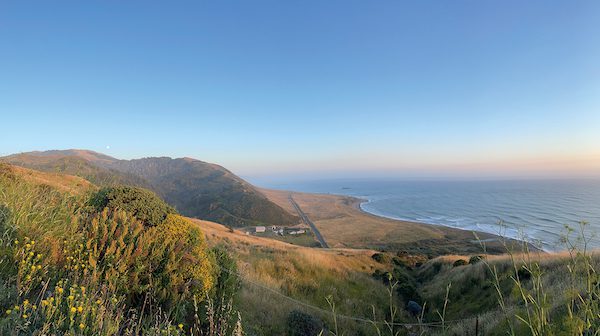
Sunset on the empty roads of the Lost Coast in Northern California, photo by Cassandra Hales
What Does It All Mean, Anyway?
According to a recent Pew Research Center survey of more than 10,000 U.S. workers, roughly six of 10 who say their jobs can be done from home are working from home all or most of the time. That same percentage says, if given a choice, they will continue to work from home indefinitely.
According to another recent Pew survey, titled, “Where People Around the World Find Meaning,” only 17 percent of adults in America mentioned “occupation and career” when describing what gives them meaning in life. Of course, I am not surprised—after all, remote work, to me, means more flexibility to enjoy my life, not my occupation and career. What is surprising, however, is how the search for meaning continues to dominate our cultural conversation.
“Your generation only cares about ways to be happy,” my mother said. “No other generation before yours ever talked so much about purpose and meaning.”
I was too busy looking into working farm stays in Slovenia to respond. But I think I understand her point. Throughout the millennia of human existence, we have extracted meaning from the limited functions of our few opportunities. I am the one who gathers the berries. I am the one who hunts for meat. We raised our children and worked for the mutual survival of our community. Occasionally, on quiet nights, the children asleep by the warmth of the fire, we painted our stories with charcoal and pigment on cave walls; we stood beyond the light of the flame and stared into the night sky. And then we arose in the morning and went back to work, perpetually, until we died.
Personally, I blame Abraham Maslow. In 1943, he published his paper, “A Theory of Human Motivation,” which led to the hierarchy of needs we have all likely seen or heard referenced a few times too many.
In short, Maslow claims that once we meet our physiological needs for food, water and shelter, we must meet our psychological needs for love, respect and—ultimately—self-actualization. He said, “What a man can be, he must be.”
My generation is haunted by that sentiment. In 1943, and in the roughly 200,000 years of human existence that preceded it, there were serious limitations to what a person could be. Only the very rich could live anywhere, anytime, and maintain a monied lifestyle. Now, however, freedom of movement is no longer the privilege of the one percent. It is, according to the Pew Research Center survey of adults with computer jobs, the privilege of the 60 percent. And you probably know some of them.
We are two of them. We have journeyed up the pyramid of needs and arrived at the pinnacle of self-actualization. What we can be, we must be. But in a world where we can be anything, what must we be? This time next year, I can be fluent in Spanish. I can restore another Chevy Astro. I can run for local office. I can write a series of children’s books. I can break the world record for number of bounces on a pogo stick (currently 206,864). But must I?
I don’t know. Lately, I have come to suspect that meaning is like a rainbow: nice to admire briefly from a distance, but if you set off searching for the treasure, you will end up lost, defeated and far from home.
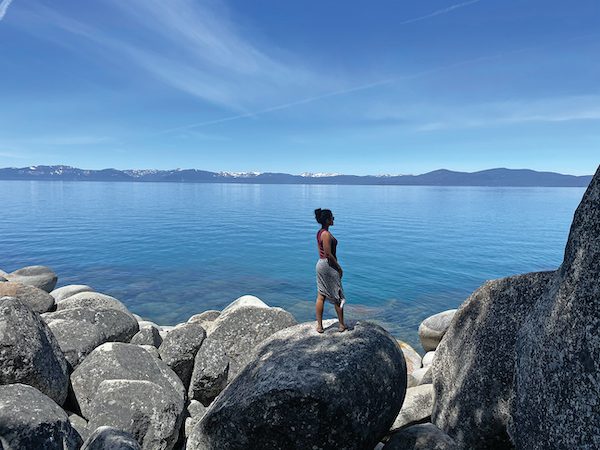
Everyone remembers the first time they saw Lake Tahoe; for Cassandra Hales, it was a reminder of the seemingly limitless beauty of California, photo by Michael Rohm
Creeping Up on a Crossroad
Today, Cassie and I are in Portland, Oregon. We are dog-sitting for a couple we met on a website that connects remote workers with people who need someone to watch their home. In theory, it works great—we get somewhere to stay for free; they get someone to take care of their home and pets for free.
In reality, we are stuck in a poorly ventilated house in the hottest part of August with an adolescent American bulldog and a 4-month-old French bulldog. I don’t like the dogs much, who are poorly trained, and I don’t like the owners much, who have poorly trained them and who, in my opinion, have curated a collection of books a little too neatly, as though they hired a literary interior designer to place the right combination of David Foster Wallace, James Baldwin and titillating think pieces on non-monogamous relationships.
Thankfully, we are in this house for only one week. Next week we will stay at a house in Port Orford, Oregon—a beautiful homestead on 8 acres overlooking the Pacific Ocean.
After that, the future is a mystery. We want to buy a house again, but we don’t know exactly where—and anyway, homes are too expensive right now. Perhaps, for a year or so, we will rent a house in Reno. We can ski Tahoe in the winter and ride bikes in the summer. Perhaps we will fly to the Azores. I can surf and my wife can try to like seafood. We will both learn Portuguese. Perhaps we will make a life out of a van—not to be confused with #VanLife, about which I have very strong opinions. Perhaps we will just sit in one spot quite still while the money from the sale of our home grows into more money and think about the potential energy of what it could become. The promise of money, it seems, is that it can become anything. And so, it seems, can we.
Or perhaps we’re all just walking in a maze in the sand at low tide. Messages come and go. Someone plays a pan flute. We continue to wander around in circles with total strangers. When the tide rises, the maze disappears.
I know the water is rising, but I don’t know where I am in the maze. I struggle to enjoy the journey. How do you love what you are going to lose?
Maybe that’s the point. The maze is beautiful because it is impermanent. Soon, it will all wash away. Why am I holding so tightly to my dream stone? I open my fingers, let it fall to the ground. Cassie takes my empty hand in hers. We continue through the maze together.
Michael Rohm is a humanitarian storyteller and freelance writer currently living on the road. He looks forward to settling down soon and planting at least one lavender bush.



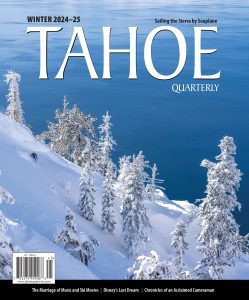
No Comments